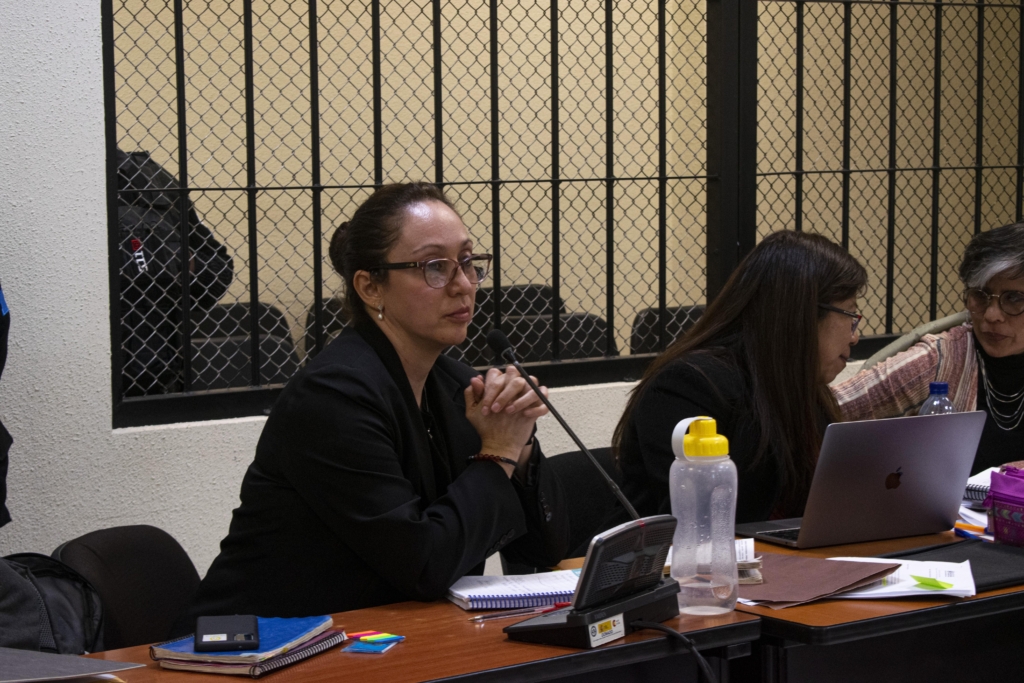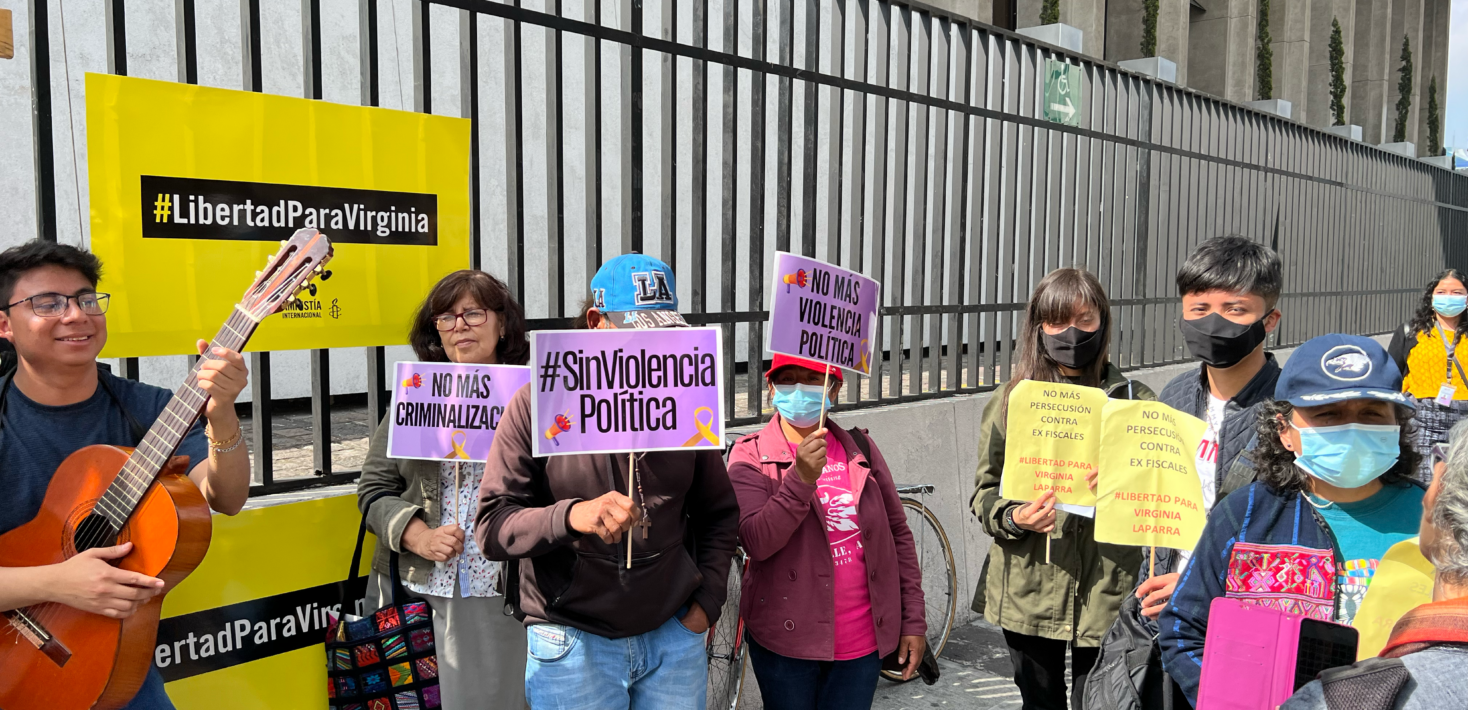The pattern of continued harassment by officials from the Public Prosecutor’s Office and the Judiciary through their abuse of the criminal justice system, in order to suppress or disrupt the fight against corruption and impunity, includes several forms of gender-based violence and discrimination that punish criminalized women twice, Amnesty International said today upon publishing their new report, “The entire system against us:” Criminalization of Women Justice Operators and Human Rights Defenders In Guatemala.
“It is alarming to see how officials from the Public Prosecutor’s Office and the Judiciary in charge of these cases have not only adopted a perverse strategy of unfounded criminal persecution and intimidation, but have also allowed gender-based violence and discrimination against criminalized women justice operators and human rights defenders to go unchecked, with total indifference and impunity,” said Ana Piquer, Americas director at Amnesty International.
- Read the report: “The entire system against us:” Criminalization of Women Justice Operators and Human Rights Defenders In Guatemala
- Take action: Protect the right to protest in Guatemala
Individuals who were professionally involved in the fight against impunity and corruption face coordinated actions intended to arbitrarily prosecute and detain them by means of unfounded charges brought in criminal proceedings without any guarantee of a fair trial. These actions make up a pattern of criminalization and harassment and constitute human rights violations attributable to the Public Prosecutor’s Office and the Judiciary.
‘Instead of being protected, these women received additional punishments simply for having dared to confront impunity and traditionally established gender roles.’
Ana Piquer, Americas director, Amnesty International
Based on interviews and the documentation of a significant number of cases, the report sets out the characteristics of such pattern and the effects of these practices, which are illegal under international human rights law. The report focuses on the stories of former judge Erika Aifán, prisoner of conscience and former prosecutor Virginia Laparra, former assistant prosecutors Paola Escobar and Aliss Morán, and Claudia González, a lawyer who previously represented the CICIG (International Commission against Impunity in Guatemala) before the courts, all of whom were subjected to unfair trials simply for having performed legitimate duties within the criminal justice system.
“Instead of being protected, these women received additional punishments simply for having dared to confront impunity and traditionally established gender roles,” added Ana Piquer.
A pattern of human rights violations
Research shows that justice operators and human rights defenders often face several criminal, administrative and disciplinary complaints at the same time. Amnesty International believes that the extremely high number of simultaneous lawsuits lacking sufficient legal or factual grounds analysed in the report, together with the fact that these lawsuits are brought by the authorities with the sole intention of punishing or silencing justice operators and human rights defenders, means that these cases can be considered strategic lawsuits against public participation, also known as SLAPPs.
The report details how, throughout the criminal proceedings, criminalized individuals face a plethora of violations of their rights at the hands of the Public Prosecutor’s Office and the Judiciary. Amnesty International has documented, for instance, that the authorities have made improper use of pre-trial detention, imposing this measure without respect to international standards relating thereto, and have allowed prolonged detention of individuals who are not brought before a judge until weeks after their arrest, in violation of national and international law. There have also been violations of the presumption of innocence and the right to defence, repeated unlawful restrictions on the public nature of hearings and a pattern of unjustified delays in proceedings and hearings. It is also noteworthy that certain types of offence are used more frequently in criminalization cases, such as abuse of authority, disclosure of information and dereliction of duty, and that a significant number of these cases are being heard only by a limited number of Criminal Courts of First Instance.
Meanwhile, criminalized individuals face constant harassment in public spaces and online. Attacks on social media, from large numbers of coordinated accounts (netcentres), include insults, degrading messages towards the individuals and their families, surveillance and even threats of arrest, injury or death. These attacks are used strategically by their perpetrators at key moments in the legal process to increase intimidation and harassment towards criminalized individuals.
Information gathered by Amnesty International shows that complaints aimed at stopping this type of harassment are blocked or thrown out. In addition, the same accounts that carry out online attacks have leaked onto social media, with full impunity, information about cases that should only be known by the authorities, anticipating, for example, operations or other actions by these authorities.
Worryingly, Amnesty International has also documented that these tactics have grown, strengthened and been replicated to such an extent that more and more justice operators and human rights defenders have been impacted in recent years, generating a profoundly chilling effect on professionals working in the justice sector in the country.
Human rights defenders in Guatemala face discrimination, gender-based violence
Persons subject to criminalization often face specific acts of discrimination, gender-based violence and racism. In particular, this affects women justice operators and human rights defenders who have participated in efforts to combat corruption and challenged roles that are traditionally and socially associated with “masculinity” in the justice system.
Testimonies received by Amnesty International include misogynistic remarks and gestures in the course of a trial, as well as multiple messages and manipulated photographs shared on social media, all aimed at diminishing the value of these women as both professionals and in their personal capacity.

Unfortunately, research shows that the authorities have failed to meet their obligations to prevent and punish discrimination and violence by not putting a stop to such practices, which have occurred on more than one occasion during hearings in the criminal proceedings against criminalized women justice operators and human rights defenders, and by not adequately investigating complaints related to online violence.
“The judge should have stopped the adhesive plaintiff for his misogynistic remarks, verbal abuse, and questioning of our personal lives, which had nothing to do with the case, but he failed to do so. One prosecutor even laughed. We were the ones who had to stop them,” said a female lawyer and human rights defender interviewed for this report.
This lack of protection, together with other issues related to their gender and caregiving roles, has also had differentiated impacts on criminalized women that affect different aspects of their lives.
Justice derailed, society at risk
Disturbingly, the pattern of criminalization analyzed reveals not only setbacks in the fight against impunity but also the derailment of justice in the country. Both Guatemalan law and international human rights law state that judges and prosecutors must be able to carry out their work without pressure. However, in the cases analyzed, the Public Prosecutor’s Office and the Judiciary have not protected the independence of their staff, despite the fact that this element is key in order to guarantee the proper administration of justice and the human rights of the population.
The organization notes with deep concern that the four cases of criminalization detailed in the report stem from allegations and investigations of corruption within the justice system itself, including in appointment of judges.
‘The fact that the women who reported, investigated or heard these cases of corruption are the ones who are now on trial and may have even faced prison is symptomatic of an ailing justice system.’
Ana Piquer, Americas director, Amnesty International
Amnesty International believes that the systematic criminalization of justice operators and human rights defenders who have strengthened the fight against corruption is dangerous, as it calls into question the proper performance of judicial functions and drives impunity, which in turn jeopardizes access to justice for victims of crime and human rights violations. Furthermore, it has a chilling effect that extends beyond the legal arena, impacting negatively on freedom of expression and the right to defend human rights in society as a whole.
“The fact that the women who reported, investigated or heard these cases of corruption are the ones who are now on trial and may have even faced prison is symptomatic of an ailing justice system. The Guatemalan authorities must urgently change course in order to heal their institutions, placing the rights of all people in Guatemala at the centre, in accordance with international law, and putting an end to this politically motivated criminal persecution,” Ana Piquer further stated.
Among its recommendations, Amnesty International urges the authorities to dismiss criminal complaints that are unfounded and have the aim or effect of undermining the work of justice operators and human rights defenders, intimidating them or punishing them for their work, and to investigate judicial harassment and all forms of bullying, discrimination and gender-based violence described in the report.
In addition, it is crucial that authorities adopt policies and measures to identify, prevent and punish gender-based violence and discrimination against women justice operators, human rights defenders and journalists, including in online environments.
The organization also recommends adopting measures that facilitate the reinstatement of staff from the Public Prosecutor’s Office who have been forced to resign, arbitrarily dismissed or unfairly sanctioned in the context previously described, and ensuring that the selection procedures for judges of the Supreme Court of Justice and appellate divisions are transparent and based on the suitability, merit and independence of the candidate.
Header photo credit: Carlos Mendoza/Amnesty International






















